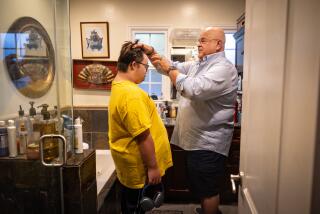Governor, show us the fraud
- Share via
Gov. Arnold Schwarzenegger has made fraud in California’s In-Home Supportive Services program a budget issue as the state tries to deal with its financial crisis.
The in-home program provides critical care to 430,000 low-income Californians in their homes so they are not forced to move into institutions or onto the streets. It is often cited -- including by Schwarzenegger -- as a key to keeping Californians out of nursing homes that would cost the state much more.
Everyone is against fraud, but what exactly is Schwarzenegger talking about? How much of the program’s money is wasted on fraud?
The governor can’t seem to make up his mind. A couple of years ago, he estimated it at 10%, so the state spent thousands and thousands of dollars retraining county social workers, who assess the program’s consumers. After home visits, the social workers discovered that the vast majority of Californians receiving aid were eligible and in need of the services.
On July 2, the governor told a news conference that “our In-Home Supportive Services program is riddled with fraud.” A day later, in an Op-Ed article in this newspaper, he wrote: “Although this kind of abuse of taxpayer dollars is not rampant, we know it exists.” And then last week, basing his numbers on what “some people say,” Schwarzenegger estimated that 25% of the IHSS program is fraud.
In his Op-Ed and in answer to follow-up questions about in-home-care fraud, the governor refers to recent grand jury reports from six counties that found there were no safeguards against fraud in their programs. He cites care providers who collect checks under aliases or who over-report their hours, and he says greater vigilance would save the state hundreds of millions of dollars this year alone.
But where are the details?
A Contra Costa Times reporter took a closer look. In San Bernardino County, according to a July 8 story, of 19,798 IHSS recipients, the grand jury found that there were about 60 fraud cases a year referred by investigators. The reporter, James Koren, pointed out that even if all 60 cases were ultimately proved to be fraud, that would yield a rate of 0.3% -- not quite “massive amounts of fraud.”
Sacramento County, meanwhile, reported that, in fiscal year 2006-2007, there were 397 reports of suspected fraud out of 17,735 cases, a rate of 2.2%. Of these, 31 were accepted for prosecution, a rate of 0.2% of prosecutable fraud.
In Los Angeles County, the district attorney recently said that, as the largest county with 200,000 In-Home Support Services consumers, L.A. had the largest amount of abuse. However, the Los Angeles Commission for Public Social Services reviewed a 2008 grand jury investigation and found it lacking in documentation, with “no evidence to support the allegations.”
Which brings us back to the governor. He has cited one unfortunate situation -- a son, the in-home caregiver for his father, who delivered appallingly poor care -- and called that fraud. I understand the point, but in reality this is more an example of elder abuse, not fraud that costs taxpayers money. That’s because no one claims the father wasn’t eligible or deserving. Even if the state had discovered the abuse and stopped paying the son, it wouldn’t have ended the father’s need for help.
If the governor wants to find and eliminate fraud and protect seniors and people with disabilities, he should proceed based on evidence, not on unfounded estimates.
He must be honest about the high costs of proposed anti-fraud measures, such as his suggestion that we launch a mass fingerprinting program for those receiving care and for caregivers. That might help prevent some fraud, but show us the cost-benefit analysis that proves it saves money.
Finally, he should restore the cuts that have reduced the number of county social workers and Adult Protective Services and county ombudsmen, who are the “first responders” against fraud and abuse, and use the same diligence against all providers -- including nursing homes, where there is meticulous documentation of needless death and abuse.
He should not single out Californians who need assistance to live at home and the people who help them stay safe.
More to Read
Get the L.A. Times Politics newsletter
Deeply reported insights into legislation, politics and policy from Sacramento, Washington and beyond. In your inbox twice per week.
You may occasionally receive promotional content from the Los Angeles Times.










